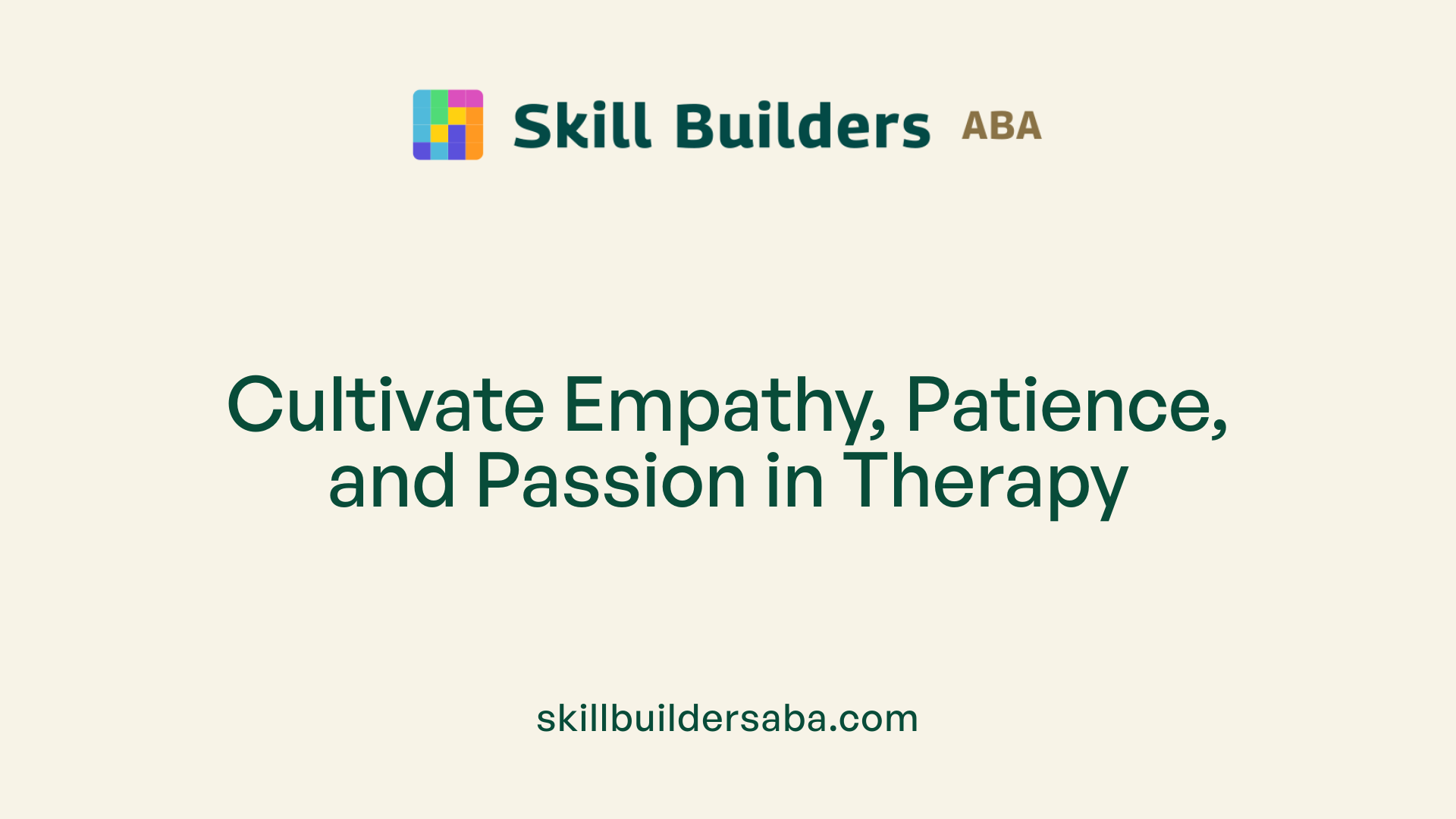
What makes a good ABA therapist
Unveiling the Qualities of an Exceptional ABA Therapist
Understanding the Traits That Drive Effective Autism Support
The field of Applied Behavior Analysis (ABA) has proven to be a cornerstone in autism intervention, and the success of therapy hinges critically on the qualities and qualifications of the therapist. This article explores what makes an ABA therapist truly effective, highlighting key characteristics, ethical practices, training requirements, and the approaches that lead to positive outcomes for children and their families.
Core Personal Traits of an Effective ABA Therapist

What are the key characteristics and traits that define a good ABA therapist?
A highly effective ABA therapist combines a variety of personal qualities and professional skills to support children with Autism Spectrum Disorder effectively. Central among these are strong active listening and communication abilities. These skills enable therapists to understand clients' behaviors, triggers, and motivations more clearly by observing verbal and non-verbal cues, maintaining eye contact, and facing clients directly.
Empathy, patience, and persistence are vital traits. Empathy involves truly understanding a child's perspective and feelings, creating a trusting environment that fosters openness and growth. Patience and persistence are necessary to work through challenging behaviors and sustain progress over time.
Creativity and adaptability play significant roles in tailoring interventions. Good therapists develop innovative ways to communicate and engage with children, often adjusting strategies based on ongoing assessments and individual responses.
A sincere passion for helping others and a genuine commitment to their clients’ well-being inspire therapists to go beyond basic requirements. Professionals actively seek to improve their skills through continual learning and stay updated with the latest research and methodologies in ABA.
In addition, an effective therapist diligently collects and analyzes data to monitor progress and refine treatment strategies. This evidence-based approach ensures that each plan directly benefits the client, supporting skill acquisition rather than solely reducing problematic behaviors.
Finally, qualities such as professionalism, emotional maturity, approachability, and a heartfelt dedication to making a difference are what truly set exceptional ABA therapists apart. These combined traits ensure that therapy is not only scientifically sound but also compassionate, flexible, and responsive to each child's unique journey.
Qualifications and Continued Education for ABA Therapists
What qualifications and skills are essential for effective ABA therapy?
Effective ABA therapy is rooted in solid qualifications and a commitment to ongoing learning. At a minimum, therapists should hold a bachelor's degree in fields such as psychology, education, or child development. More specialized roles, like a Board Certified Behavior Analyst (BCBA), require a master's degree or higher in Applied Behavior Analysis or related disciplines.
In addition to formal education, practitioners must acquire practical skills through supervised fieldwork. This usually involves completing between 1,000 to 2,000 hours of hands-on experience, which helps develop competencies like behavioral assessment, intervention planning, and data collection.
Certification plays a vital role in professional practice. The Behavior Analyst Certification Board (BACB) offers credentials such as the BCBA or Registered Behavior Technician (RBT). These certifications affirm that a therapist has met industry standards, including passing a rigorous exam and adhering to ethical guidelines.
Beyond initial qualifications, ongoing professional development is essential. Therapists should stay updated with the latest research, technology, and methodologies in autism treatment. Continuous education ensures practitioners improve their skills, adapt to new standards, and provide the highest quality of care.
Key skills for an effective ABA therapist include strong analytical thinking to identify behavior patterns, excellent communication abilities, patience, and compassion towards clients. Mastery of data-driven intervention planning and ethical practice standards underpins successful therapy outcomes.
In summary, effective ABA therapy combines formal education, practical supervised experience, relevant certifications, and a dedication to lifelong learning. This ensures practitioners are well-equipped to support children with autism and other developmental challenges effectively.
Attributes Signifying Competence and Effectiveness

What attributes are indicative of a competent and effective ABA therapist?
A proficient ABA therapist embodies a range of personal and professional qualities that facilitate successful treatment outcomes. Empathy is fundamental, allowing the therapist to understand the client from their perspective and genuinely experience their feelings and perceptions. This emotional connection fosters trust and creates a supportive environment.
Active listening skills are equally crucial. By avoiding interruptions and paying close attention to body language, facial expressions, and verbal cues, therapists can identify patterns, triggers, and underlying motivations behind behaviors. This attentive approach aids in designing more accurate, personalized interventions.
Critical thinking and creativity enable therapists to develop and refine individualized treatment strategies. They assess each child's strengths, challenges, and history to craft programs that are both engaging and effective. Creativity especially helps in devising innovative communication methods tailored to the child's needs.
Patience and persistence are vital traits, as progress in ABA therapy often requires sustained effort and adaptability. Good therapists are flexible, willing to modify plans based on ongoing data collection and the child's response.
Training and credentials signal a therapist’s competence. Certified professionals, such as Board Certified Behavior Analysts (BCBAs), hold advanced degrees and have completed extensive coursework, supervised fieldwork, and passing rigorous exams. Those with experience working with children, especially those with Autism Spectrum Disorder, are better equipped to handle complex behaviors and develop effective interventions.
The use of data to track progress and guide decisions is a hallmark of quality practice. Reliable data collection allows adjustments that keep therapy aligned with the child’s evolving needs.
Finally, a genuine passion for helping others, combined with ethical integrity, underscores an effective therapist's dedication. They build strong, respectful relationships with clients and their families, involving caregivers in goal setting and progress review. Staying current through continuous professional development and research ensures interventions are based on the latest, evidence-backed techniques.
In essence, a capable ABA therapist combines emotional intelligence, technical expertise, creativity, and ethical commitment to foster meaningful improvements in their clients' lives.
| Attribute | Description | Additional Notes |
|---|---|---|
| Empathy | Understanding and sharing client feelings | Builds trust and rapport |
| Active Listening | Full attention to clients’ verbal and non-verbal cues | vital for identifying behaviors |
| Critical Thinking | Analyzing behavior patterns and adapting plans | Ensures personalized interventions |
| Creativity | Developing innovative communication methods | Keeps therapy engaging |
| Patience | Persisting through gradual progress | Essential for long-term success |
| Data-Driven | Using data to inform and adjust treatment | Keeps interventions objective |
| Passion and Ethics | Genuine desire to help and ethical practice | Maintains integrity and trust |
| Continuous Learning | Staying updated on research and techniques | Guarantees current best practices |
This combination of qualities ensures that ABA therapists can deliver effective, compassionate, and ethical treatment tailored to each child's unique journey toward development.
Key Qualities Valued When Selecting an ABA Therapist

What are the key qualities to look for when evaluating ABA therapists?
When choosing an ABA therapist, several qualities ensure the child receives effective, ethical, and personalized care. First, proper certification is essential. The most highly qualified practitioners are Board Certified Behavior Analysts (BCBAs), who have completed rigorous training, including a master’s or doctoral degree in psychology or behavior analysis, passed a national exam, and obtained state licensing where applicable.
Experience working with children with Autism Spectrum Disorder (ASD) is also critical. Therapists should have hands-on experience with similar cases, demonstrating familiarity with autism-specific intervention strategies such as functional behavior assessments, natural environment teaching (NET), and discrete trial training (DTT).
In addition to professional credentials, personal attributes are vital. Empathy enables therapists to understand the child's perspective, while patience and excellent communication skills foster trust and cooperation. These qualities help in establishing a positive, supportive environment conducive to learning.
Another important factor is the ability to develop and adapt individualized treatment plans. Effective therapists analyze each child's unique personality, strengths, and challenges, regularly collecting and reviewing data to track progress. They also involve families actively, ensuring that goals align with the child’s needs and that progress is sustained outside of therapy sessions.
Professional conduct and ethical practices are non-negotiable. A skilled therapist should prioritize positive reinforcement over punishment, respect cultural differences, and stick to scientifically supported methods. They should also maintain transparency with families and adhere to standards set by professional organizations like the Behavior Analyst Certification Board (BACB).
Overall, a good ABA therapist combines these professional and personal qualities. They create a nurturing atmosphere where children can flourish, learn new skills, and develop confidence. Parents should look for therapists who demonstrate a genuine passion for helping children with autism, backed by proper training, experience, and a compassionate approach.
Assessing Professional Competence and Effectiveness

What indicators help assess a professional's competence and effectiveness in ABA therapy?
Evaluating an ABA therapist's competence involves reviewing several important indicators. One of the most crucial is the measurable progress in the client's targeted skills. This includes improvements in communication, social behaviors, and daily living skills.
Therapists should use systematic data collection and analysis to track these changes. For example, charts and graphs illustrate progress, ensuring the therapy remains on track. This practice helps verify that interventions are effective and appropriately tailored to the child's needs.
Adherence to evidence-based practices and ethical standards is also a key marker. Effective ABA therapists base their treatment plans on current research, such as functional behavior assessments, natural environment teaching, or discrete trial training. They also review their interventions regularly and modify strategies if progress stalls.
Regular supervision and ongoing training are vital. Professionals who participate in continuous professional development stay updated with the latest methods and evidence. Supervision from experienced Board Certified Behavior Analysts (BCBAs) further ensures that the therapy provided meets high standards.
Feedback from clients and their families offers additional insight into a therapist’s effectiveness. Open communication allows adjustments and personalized approaches, fostering trust and ensuring the child's needs are prioritized.
Ultimately, a skilled ABA practitioner consistently demonstrates positive outcomes through data-driven results, adheres to ethical and scientific standards, and actively incorporates ongoing assessments and feedback. These indicators collectively reflect a therapist's competence and their ability to support meaningful progress for their clients.
Best Practices and Techniques in ABA Therapy
What practices and approaches are employed by successful ABA therapists?
Effective ABA therapists rely on validated methods rooted in behavioral science. They focus on positive reinforcement techniques, which encourage children to develop new skills and reinforce good behaviors without involving punishment. These professionals are skilled at customizing treatment plans for each child, carefully analyzing triggers and consequences to understand why certain behaviors occur.
Data collection is a cornerstone of successful ABA therapy. Therapists consistently monitor progress through meticulous data tracking, enabling them to adapt and refine strategies for maximum effect. Supervision by highly qualified practitioners, like Board Certified Behavior Analysts (BCBAs), ensures that therapy remains evidence-based and effective.
Collaboration with families and other team members plays an essential role, emphasizing the importance of involving caregivers in the goals and progress of therapy. This team approach ensures that interventions are aligned with the child's needs and promote generalization of skills across different settings.
Overall, proficient ABA therapists prioritize skill building over punishment, employ multifaceted assessments, and continually adapt their approaches to support each child's growth and development.
The Role of Environment and Family in Successful ABA Therapy

Creating a positive, welcoming environment
A supportive and engaging setting is crucial for effective ABA therapy. When the environment is positive, children feel comfortable and motivated to participate in therapy activities. Centers that foster warmth and encouragement help children build trust and develop a willingness to learn. Using structure combined with flexibility allows therapists to adapt activities based on each child's needs, making sessions more effective.
Family participation and education
Family involvement is essential in ABA therapy. When parents and caregivers understand the therapy goals and strategies, they can reinforce skills at home and assist in maintaining consistency. Many centers provide parent training and regular updates, creating a collaborative approach. This involvement boosts the child's progress and ensures that learned skills generalize across different settings.
Community integration
Integrating children into their community enhances their social skills and independence. Good ABA programs prioritize peer interactions and naturalistic teaching, which prepare children for real-world social settings. Community outings and social skills training enable children to practice communication and behavioral skills in everyday contexts, promoting overall development.
| Aspects | Focus Area | Details |
|---|---|---|
| Environment | Setting | Positive, supportive, flexible |
| Family | Participation | Education, involvement, consistent reinforcement |
| Community | Natural settings | Peer interactions, social skills practice |
Embarking on the Path to Effective Autism Support
The qualities, qualifications, and approaches of a skilled ABA therapist directly influence the success of intervention programs. Through demonstrated empathy, expert training, ethical practice, and a commitment to continuous learning, therapists can foster meaningful progress in their clients. Aspiring parents and caregivers should seek practitioners who embody these qualities, ensuring that children receive the highest standard of care. When the right therapist is chosen—one who combines professional expertise with genuine compassion—the pathway to improved skills, independence, and quality of life becomes a reachable goal for children with autism and their families.
References
- Skills, Abilities & Personality Traits of a Good Behavior Therapist
- How to Know If You're Getting Good ABA
- Questions to ask an ABA therapist
- Must-Have Qualities in an ABA Therapy Center for Optimal ...
- Qualifications of an Ideal ABA Therapist
- What Makes an Exceptional ABA Behavior Therapist
- Skills, Abilities & Personality Traits of a Good Behavior Therapist
- What Makes A Good ABA Therapist?
- Qualities to Consider When Looking for an ABA Therapist
Your Partner in Development
Take some time to visit our home page to see how we help children thrive. When you are ready to move from research to action, connect with us to schedule a chat.
.svg)